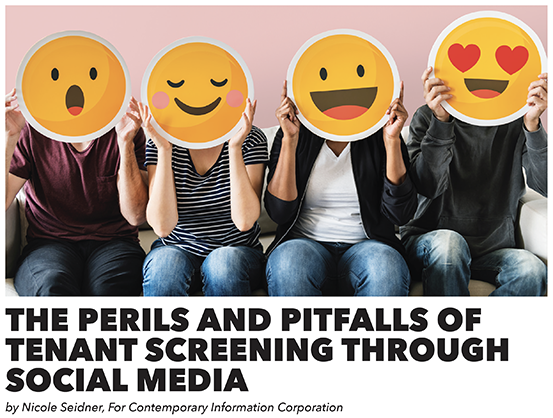The Perils and Pitfalls of Tenant Screening Through Social Media

By Nicole Seidner
The internet loves to cancel people. It’s incredibly easy to look up a person’s entire history on their Twitter, find something controversial they posted in 2012, write #Cancelled and suddenly they’re the most hated person around. The debate about if “cancel culture” is ethical is muddy with public-facing figures, but what about the average joe? You shouldn’t do this with your applicants as it will cause you to muddy the waters while screening and increase the chances of lawsuits as you see information regarding protected classes. Social media can lead landlords into searching for information that taps into implicit biases and is based solely on subjective information.
Some of the Dirty Tricks
There’s an old story of an expert coming to a business school lecture hall. They stand at the front and ask the students to raise their hand if they think they can tell whether or not they should hire someone based on the first five minutes of an interview. A good chunk of the class raises their hand, and the expert asks those who did not to look around at all those who raised their hands and take a good long look. The students with their hands in the air look smug, thinking they’ll be lauded for being inherently better than their peers, until the expert speaks again. “Those with the hands in the air are the people who will be fired, sued, tossed in the street and never find another job again,” says the expert. “The only thing you can learn about someone in the first five minutes of meeting them is their protected classes.”
The thing about social media is that you’re never going to learn more than that first five minutes’ worth of information. The same way that one has carefully curated an image to get a job they have carefully curated an image to get likes or perhaps to shell out shoddy shampoo to their friends. There’s plenty of “tricks” people talk about using to pick the perfect person to rent properties to. If you meet them and their car is a mess, then they won’t keep the property clean. If they show up in a suit, then they have a high paying job. The problem with tricks like that is, that is what they are: tricks.
You do not know if they’re a surgeon: they have to be so neat at work they don’t worry (or have the time) to keep their car clean. Or maybe they have children and it’s hard to keep on cleaning up after them. You don’t know if they rented that suit specifically to make a good first impression and they don’t have a job at all. If you start scrolling through people’s social media using tricks to jump to conclusions, you will find it far too easy to find something wrong about a potential renter, which could land you in some hot water when you start falling for implicit biases.
Implicit Biases
Let’s go with an obvious “trick” people use: unkempt hair styles. Say someone posts a selfie in the middle of a Wednesday and their hairstyle isn’t quite “professional”. For some people, curly hair is not considered professional, no matter how naturally curly one’s hair is. That’s because of a bias that was built into the professional world that people must work to overcome, and if one is not actively doing that work, then your implicit bias is going to work against you. Implicit biases are feelings or attitudes one has or associates towards groups of people, such as stereotypes, without always knowing that they are doing so. Instead of using objective data like a proper screening report, by going through someone’s social media profile, one falls into the trap of implicit biases. That’s where that Wednesday selfie can get you into the danger of blaming stereotypes.
Keep it Rational
Rational, objective data is industry standard for a reason. While there are laws in place that restrict criminal and eviction record access, there are also laws that defend that right. Social media is still the wild west legally and there aren’t any protections in place that could defend your use of it. Once you have seen a social media page from an applicant you have muddied the water. You’ve seen the protected classes, you’ve made a decision that can be said is based on that, and if you’ve denied them, a case can be made against you.
A strong defense against potential business risks and risks to your property is still objective, criminal and eviction public records and credit. This information isn’t based off of subjective looks or likes, it’s based off of financial records, criminal convictions, and court records. While it’s tempting to see what they’ve been posting on Twitter to see what ‘kind’ of person that might get rented to, keep in mind that what goes on social media is always a façade anyway. Rationally speaking, you know that people always post one of two things: the very best of who they are, or the very desperate for attention. Rationally speaking, that isn’t what you need to know about them anyway. The only thing you need to know about them can be found in an objective, informative, high-quality criminal and eviction report.
Nicole Seidner is a copywriter at ApplyConnect, an affiliate of Contemporary Information Corporation (CIC). She holds a degree in Writing from Savannah College of Art and Design with a focus in creative nonfiction. Her free time is spent taking pictures of her dogs or reading deep-dive analysis on movies that she hasn’t seen. This article has been contributed by CIC. CIC and ApplyConnect are the preferred tenant screening service providers of the Apartment Association of Greater Los Angeles. For more information, go to https://aagla.org/cic-apply-connect.








